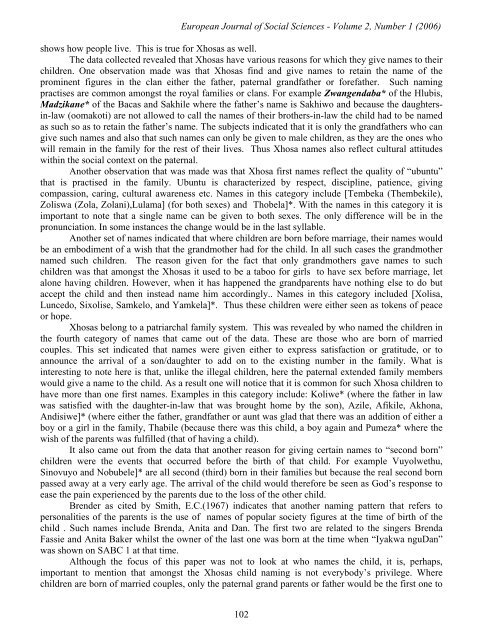EFFECT OF VITAMINS C AND E INTAKE ON BLOOD ... - EuroJournals
EFFECT OF VITAMINS C AND E INTAKE ON BLOOD ... - EuroJournals
EFFECT OF VITAMINS C AND E INTAKE ON BLOOD ... - EuroJournals
Create successful ePaper yourself
Turn your PDF publications into a flip-book with our unique Google optimized e-Paper software.
European Journal of Social Sciences - Volume 2, Number 1 (2006)<br />
shows how people live. This is true for Xhosas as well.<br />
The data collected revealed that Xhosas have various reasons for which they give names to their<br />
children. One observation made was that Xhosas find and give names to retain the name of the<br />
prominent figures in the clan either the father, paternal grandfather or forefather. Such naming<br />
practises are common amongst the royal families or clans. For example Zwangendaba* of the Hlubis,<br />
Madzikane* of the Bacas and Sakhile where the father’s name is Sakhiwo and because the daughtersin-law<br />
(oomakoti) are not allowed to call the names of their brothers-in-law the child had to be named<br />
as such so as to retain the father’s name. The subjects indicated that it is only the grandfathers who can<br />
give such names and also that such names can only be given to male children, as they are the ones who<br />
will remain in the family for the rest of their lives. Thus Xhosa names also reflect cultural attitudes<br />
within the social context on the paternal.<br />
Another observation that was made was that Xhosa first names reflect the quality of “ubuntu”<br />
that is practised in the family. Ubuntu is characterized by respect, discipline, patience, giving<br />
compassion, caring, cultural awareness etc. Names in this category include [Tembeka (Thembekile),<br />
Zoliswa (Zola, Zolani),Lulama] (for both sexes) and Thobela]*. With the names in this category it is<br />
important to note that a single name can be given to both sexes. The only difference will be in the<br />
pronunciation. In some instances the change would be in the last syllable.<br />
Another set of names indicated that where children are born before marriage, their names would<br />
be an embodiment of a wish that the grandmother had for the child. In all such cases the grandmother<br />
named such children. The reason given for the fact that only grandmothers gave names to such<br />
children was that amongst the Xhosas it used to be a taboo for girls to have sex before marriage, let<br />
alone having children. However, when it has happened the grandparents have nothing else to do but<br />
accept the child and then instead name him accordingly.. Names in this category included [Xolisa,<br />
Luncedo, Sixolise, Samkelo, and Yamkela]*. Thus these children were either seen as tokens of peace<br />
or hope.<br />
Xhosas belong to a patriarchal family system. This was revealed by who named the children in<br />
the fourth category of names that came out of the data. These are those who are born of married<br />
couples. This set indicated that names were given either to express satisfaction or gratitude, or to<br />
announce the arrival of a son/daughter to add on to the existing number in the family. What is<br />
interesting to note here is that, unlike the illegal children, here the paternal extended family members<br />
would give a name to the child. As a result one will notice that it is common for such Xhosa children to<br />
have more than one first names. Examples in this category include: Koliwe* (where the father in law<br />
was satisfied with the daughter-in-law that was brought home by the son), Azile, Afikile, Akhona,<br />
Andisiwe]* (where either the father, grandfather or aunt was glad that there was an addition of either a<br />
boy or a girl in the family, Thabile (because there was this child, a boy again and Pumeza* where the<br />
wish of the parents was fulfilled (that of having a child).<br />
It also came out from the data that another reason for giving certain names to “second born”<br />
children were the events that occurred before the birth of that child. For example Vuyolwethu,<br />
Sinovuyo and Nobubele]* are all second (third) born in their families but because the real second born<br />
passed away at a very early age. The arrival of the child would therefore be seen as God’s response to<br />
ease the pain experienced by the parents due to the loss of the other child.<br />
Brender as cited by Smith, E.C.(1967) indicates that another naming pattern that refers to<br />
personalities of the parents is the use of names of popular society figures at the time of birth of the<br />
child . Such names include Brenda, Anita and Dan. The first two are related to the singers Brenda<br />
Fassie and Anita Baker whilst the owner of the last one was born at the time when “Iyakwa nguDan”<br />
was shown on SABC 1 at that time.<br />
Although the focus of this paper was not to look at who names the child, it is, perhaps,<br />
important to mention that amongst the Xhosas child naming is not everybody’s privilege. Where<br />
children are born of married couples, only the paternal grand parents or father would be the first one to<br />
102
















